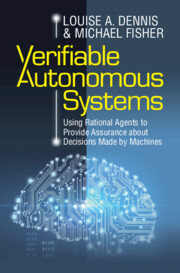
-
Select format
-
- Publisher:
- Cambridge University Press
- Publication date:
- 25 May 2023
- 08 June 2023
- ISBN:
- 9781108755023
- 9781108484992
- Dimensions:
- (228 x 152 mm)
- Weight & Pages:
- 0.71kg, 392 Pages
- Dimensions:
- Weight & Pages:
You may already have access via personal or institutional login
Book description
How can we provide guarantees of behaviours for autonomous systems such as driverless cars? This tutorial text, for professionals, researchers and graduate students, explains how autonomous systems, from intelligent robots to driverless cars, can be programmed in ways that make them amenable to formal verification. The authors review specific definitions, applications and the unique future potential of autonomous systems, along with their impact on safer decisions and ethical behaviour. Topics discussed include the use of rational cognitive agent programming from the Beliefs-Desires-Intentions paradigm to control autonomous systems and the role model-checking in verifying the properties of this decision-making component. Several case studies concerning both the verification of autonomous systems and extensions to the framework beyond the model-checking of agent decision-makers are included, along with complete tutorials for the use of the freely-available verifiable cognitive agent toolkit Gwendolen, written in Java.
Contents
Metrics
Altmetric attention score
Full text views
Full text views help Loading metrics...
Loading metrics...
* Views captured on Cambridge Core between #date#. This data will be updated every 24 hours.
Usage data cannot currently be displayed.
Accessibility standard: Unknown
Why this information is here
This section outlines the accessibility features of this content - including support for screen readers, full keyboard navigation and high-contrast display options. This may not be relevant for you.
Accessibility Information
Accessibility compliance for the HTML of this book is currently unknown and may be updated in the future.


